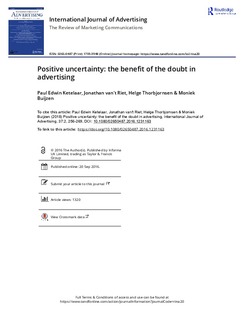| dc.contributor.author | Ketelaar, Paul | |
| dc.contributor.author | Van'T Riet, Jonathan | |
| dc.contributor.author | Thorbjørnsen, Helge | |
| dc.contributor.author | Buijzen, Moniek | |
| dc.date.accessioned | 2019-06-07T07:35:25Z | |
| dc.date.available | 2019-06-07T07:35:25Z | |
| dc.date.created | 2016-11-14T15:23:11Z | |
| dc.date.issued | 2018 | |
| dc.identifier.citation | International Journal of Advertising. 2018, 37 (2), 256-269. | nb_NO |
| dc.identifier.issn | 0265-0487 | |
| dc.identifier.uri | http://hdl.handle.net/11250/2600259 | |
| dc.description.abstract | Positive uncertainty refers to uncertainty surrounding an anticipated
positive outcome. It provides consumers with the opportunity to
imagine and speculate on a product’s or experience’s potentially
positive characteristics. Research has shown that when uncertainty
is associated with something positive, consumers may prefer
uncertainty to certainty. In a between-subjects experimental design
with a large US (n = 446) and Japanese sample (n = 453), the
present study demonstrates that positive uncertainty increases
consumers’ positive feelings when they evaluate a product,
particularly for high-involvement products that allow consumers to
imagine and speculate about potentially positive product benefits.
Unexpectedly, the study findings are consistent across the two
different markets, which vary substantially in terms of consumers’
level of uncertainty avoidance. Specifically, results show that futureframed advertisements are effective in generating positive
uncertainty and that positive uncertainty generates positive
attitudes, both in countries scoring high (Japan) and low (USA) on
uncertainty avoidance. | nb_NO |
| dc.language.iso | eng | nb_NO |
| dc.rights | Attribution-NonCommercial-NoDerivatives 4.0 Internasjonal | * |
| dc.rights.uri | http://creativecommons.org/licenses/by-nc-nd/4.0/deed.no | * |
| dc.subject | positive uncertainty | nb_NO |
| dc.subject | future-framed advertising | nb_NO |
| dc.subject | USA and Japan | nb_NO |
| dc.subject | attitude toward the ad | nb_NO |
| dc.subject | attitude toward the brand | nb_NO |
| dc.subject | attitude toward the product | nb_NO |
| dc.title | Positive uncertainty: the benefit of the doubt in advertising | nb_NO |
| dc.type | Journal article | nb_NO |
| dc.type | Peer reviewed | nb_NO |
| dc.description.version | publishedVersion | nb_NO |
| dc.subject.nsi | VDP::Social science: 200::Economics: 210::Economics: 212 | nb_NO |
| dc.source.pagenumber | 256-269 | nb_NO |
| dc.source.volume | 37 | nb_NO |
| dc.source.journal | International Journal of Advertising | nb_NO |
| dc.source.issue | 2 | nb_NO |
| dc.identifier.doi | 10.1080/02650487.2016.1231163 | |
| dc.identifier.cristin | 1400272 | |
| cristin.unitcode | 191,0,0,0 | |
| cristin.unitname | Norges Handelshøyskole | |
| cristin.ispublished | true | |
| cristin.fulltext | original | |
| cristin.qualitycode | 1 | |

